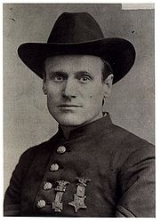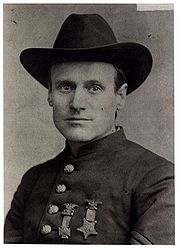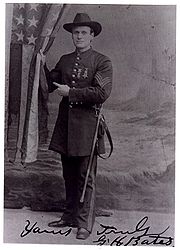
Gilbert Bates
Encyclopedia
Gilbert Henderson Bates was an American soldier best known for his peaceful postwar march throughout the American south.
Before the American Civil War
, Bates was a farmer in the town of Albion
, near Edgerton, Wisconsin
. During the war, he served as a Sergeant in the 1st Wisconsin Heavy Artillery Regiment
. After the war, he returned to his farm. In November 1867, during the period known as Reconstruction, Bates had a conversation about the South with a neighbor, who said, "Sergeant, the Southerners are rebels yet. They are worse now than they were during the war. They hate the Union flag. No man dare show that flag anywhere in the South except in the presence of our soldiers." Bates replied, "You are mistaken. I can carry that flag myself from the Mississippi all over the rebel States, alone and unarmed, too." Thus began his march, reported at the time in numerous local and national newspapers, but now largely forgotten.

 On February 27, 1868, Mark Twain
On February 27, 1868, Mark Twain
published the following in the Territorial Enterprise:
Bates won his bet. During a three-month "march" which started in Vicksburg where he was welcomed by the mayor, he walked 1400 miles across Mississippi, Alabama, Georgia, South Carolina, North Carolina and Virginia to Washington, carrying the Stars and Stripes, and he was granted hospitality all along the way. He recorded his journey in a pamphlet published in June 1868 titled The Triumphal March of Sergeant Bates from Vicksburg to Washington. In an irony of the times, although he was allowed to raise his flag over numerous official buildings in the South, including the state Capitol in Richmond, he was not granted permission to fly it at the Capitol in Washington.
In September 2003 a dramatization of Bates's story titled "The Saga of Sergeant Bates: the Most Sensational March in American History", by John Nicholas Schweitzer, was produced for the Edgerton (Wisconsin) bicentennial.
Before the American Civil War
American Civil War
The American Civil War was a civil war fought in the United States of America. In response to the election of Abraham Lincoln as President of the United States, 11 southern slave states declared their secession from the United States and formed the Confederate States of America ; the other 25...
, Bates was a farmer in the town of Albion
Albion, Dane County, Wisconsin
Albion is a town in Dane County, Wisconsin, United States, located about 27 miles southeast of Madison on Interstate 90. The population was 1,823 at the 2000 Census. The unincorporated communities of Albion and Hillside are located in the town.-History:...
, near Edgerton, Wisconsin
Edgerton, Wisconsin
Edgerton is a city in Dane and Rock Counties in the U.S. state of Wisconsin. The population was 4,933 at the 2000 census. Known locally as "Tobacco City U.S.A.," because of the importance of tobacco growing in the region, Edgerton continues to be a center for the declining tobacco industry in the...
. During the war, he served as a Sergeant in the 1st Wisconsin Heavy Artillery Regiment
1st Wisconsin Heavy Artillery Regiment
The 1st Regiment Wisconsin Heavy Artillery was an artillery regiment that served in the Union Army during the American Civil War.-Service:The 1st Wisconsin Heavy Artillery was originally organized by companies over a considerable period of time and did not serve together as a complete...
. After the war, he returned to his farm. In November 1867, during the period known as Reconstruction, Bates had a conversation about the South with a neighbor, who said, "Sergeant, the Southerners are rebels yet. They are worse now than they were during the war. They hate the Union flag. No man dare show that flag anywhere in the South except in the presence of our soldiers." Bates replied, "You are mistaken. I can carry that flag myself from the Mississippi all over the rebel States, alone and unarmed, too." Thus began his march, reported at the time in numerous local and national newspapers, but now largely forgotten.


Mark Twain
Samuel Langhorne Clemens , better known by his pen name Mark Twain, was an American author and humorist...
published the following in the Territorial Enterprise:
Sergeant Gilbert H. Bates of Wisconsin is the last candidate for pedestrian notoriety. He has made a bet that he will walk, alone, unarmed, and without a cent in his pocket, and bearing aloft the American flag, through the late Southern Confederacy, from Vicksburg to Washington. He is already on his way, and the telegraph is noting his progress. The Mayor and a large portion of the population of Vicksburg ushered him out of that city with a grand demonstration. He proposes to sell photographs of himself at 25 cent apiece, all along his route, and convert the proceeds into a fund to be devoted to the aid and comfort of widows and orphans of soldiers who fought in the late war, irrespective of flag or politics. And then, I suppose, when he gets a good round sum together for the widows and orphans, he will hang up his flag and go and have a champagne blow-out. I don't believe in people who collect money for benevolent purposes and don't charge for it. I don't have full confidence in people who walk a thousand miles for the benefit of widows and orphans and don't get a cent for it. I question the uprightness of people who peddle their own photographs, anyhow, whether they carry flags or not. In my opinion a man might as well start his name with an initial and spell his middle name out and hope to be virtuous. But this fellow will get more black eyes, down there among those unreconstructed rebels than he can ever carry along with him without breaking his back. I expect to see him coming into Washington some day on one leg and with one eye out and an arm gone. He won't amount to more than an interesting relic by the time he gets here and then he will have to hire out for a sign for the Anatomical Museum. Those fellows down there have no sentiment in them. They won't buy his picture. They will be more likely to take his scalp.
Bates won his bet. During a three-month "march" which started in Vicksburg where he was welcomed by the mayor, he walked 1400 miles across Mississippi, Alabama, Georgia, South Carolina, North Carolina and Virginia to Washington, carrying the Stars and Stripes, and he was granted hospitality all along the way. He recorded his journey in a pamphlet published in June 1868 titled The Triumphal March of Sergeant Bates from Vicksburg to Washington. In an irony of the times, although he was allowed to raise his flag over numerous official buildings in the South, including the state Capitol in Richmond, he was not granted permission to fly it at the Capitol in Washington.
In September 2003 a dramatization of Bates's story titled "The Saga of Sergeant Bates: the Most Sensational March in American History", by John Nicholas Schweitzer, was produced for the Edgerton (Wisconsin) bicentennial.

